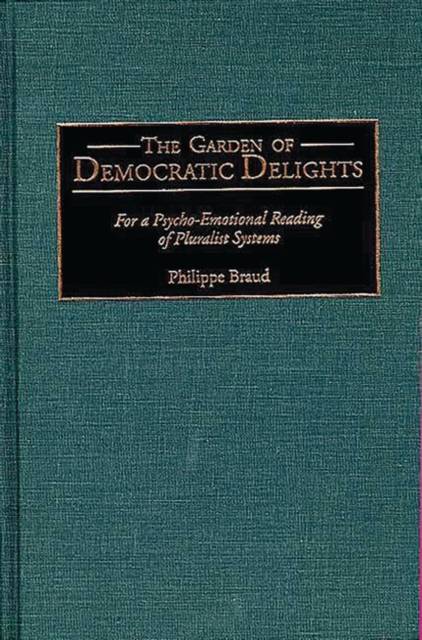
En raison d'une grêve chez bpost, votre commande pourrait être retardée. Vous avez besoin d’un livre rapidement ? Nos magasins vous accueillent à bras ouverts !
- Retrait gratuit dans votre magasin Club
- 7.000.000 titres dans notre catalogue
- Payer en toute sécurité
- Toujours un magasin près de chez vous
En raison de la grêve chez bpost, votre commande pourrait être retardée. Vous avez besoin d’un livre rapidement ? Nos magasins vous accueillent à bras ouverts !
- Retrait gratuit dans votre magasin Club
- 7.000.0000 titres dans notre catalogue
- Payer en toute sécurité
- Toujours un magasin près de chez vous
The Garden of Democratic Delights
For a Psycho-Emotional Reading of Pluralist Systems
Philippe Braud
Livre relié | Anglais
127,45 €
+ 254 points
Description
Pluralist democratic systems, according to Philipe Braud, do not do what they claim to do, but rather, serve to channel, diffuse, or reconcile society's conflicts. As one reviewer of the original French edition notes, the book can be seen as part of a long tradition in European political thought that sees democracy as a front for capitalism.
Braud asserts that pluralist democracy is credible only because of the complete failure of communism. There is no government by the people; the rule of law is a tautology. What fundamental changes occur happen because of the forces of economics, culture, and labor, and in response to political direction. The efficacy of democracy comes from its ability to manage social emotions, specifically by addressing anguish with promises of security and identity: by meeting the need to be wooed and seduced by constant personalization of politics, offering the illusion of choice; by transposing the frustrations of gender, age, and class inequalities into the political domain; by providing pleasure in the game of politics; and by promising greed, power, and its prerequisites. Pluralist democracies know best how to manage these emotions, and how to use them without suffocating them. A powerful and disturbing vision of pluralist democracy that will be of great interest to students and scholars of contemporary political thought.Spécifications
Parties prenantes
- Auteur(s) :
- Editeur:
Contenu
- Nombre de pages :
- 184
- Langue:
- Anglais
Caractéristiques
- EAN:
- 9780275957483
- Date de parution :
- 30-10-98
- Format:
- Livre relié
- Format numérique:
- Genaaid
- Dimensions :
- 152 mm x 229 mm
- Poids :
- 439 g

Les avis
Nous publions uniquement les avis qui respectent les conditions requises. Consultez nos conditions pour les avis.






